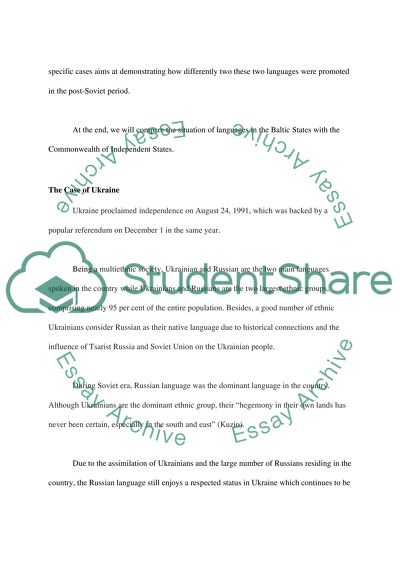Cite this document
(“It can be argued that one of the consequences of disintegration in th Essay - 1”, n.d.)
It can be argued that one of the consequences of disintegration in th Essay - 1. Retrieved from https://studentshare.org/miscellaneous/1576080-it-can-be-argued-that-one-of-the-consequences-of-disintegration-in-th-ussr-is-the-promotion-of-some-hitherto-secondary-languages-to-primary-status-discuss-this-claim-in-relation-to-any-of-the-countries-in-the-new-commonwealth-of-independent-states-cis
It can be argued that one of the consequences of disintegration in th Essay - 1. Retrieved from https://studentshare.org/miscellaneous/1576080-it-can-be-argued-that-one-of-the-consequences-of-disintegration-in-th-ussr-is-the-promotion-of-some-hitherto-secondary-languages-to-primary-status-discuss-this-claim-in-relation-to-any-of-the-countries-in-the-new-commonwealth-of-independent-states-cis
(It Can Be Argued That One of the Consequences of Disintegration in Th Essay - 1)
It Can Be Argued That One of the Consequences of Disintegration in Th Essay - 1. https://studentshare.org/miscellaneous/1576080-it-can-be-argued-that-one-of-the-consequences-of-disintegration-in-th-ussr-is-the-promotion-of-some-hitherto-secondary-languages-to-primary-status-discuss-this-claim-in-relation-to-any-of-the-countries-in-the-new-commonwealth-of-independent-states-cis.
It Can Be Argued That One of the Consequences of Disintegration in Th Essay - 1. https://studentshare.org/miscellaneous/1576080-it-can-be-argued-that-one-of-the-consequences-of-disintegration-in-th-ussr-is-the-promotion-of-some-hitherto-secondary-languages-to-primary-status-discuss-this-claim-in-relation-to-any-of-the-countries-in-the-new-commonwealth-of-independent-states-cis.
“It Can Be Argued That One of the Consequences of Disintegration in Th Essay - 1”, n.d. https://studentshare.org/miscellaneous/1576080-it-can-be-argued-that-one-of-the-consequences-of-disintegration-in-th-ussr-is-the-promotion-of-some-hitherto-secondary-languages-to-primary-status-discuss-this-claim-in-relation-to-any-of-the-countries-in-the-new-commonwealth-of-independent-states-cis.


